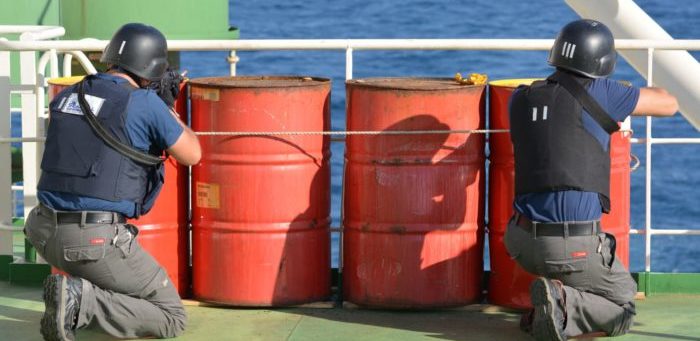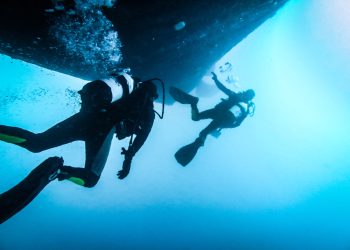The sea is a very vulnerable place with easy access to terrorist and pirate attacks, as there are not any boarders or limits to the activities taking place at the ocean and open seas, thus mariners face a big threat even if they operate at ports or onboard vessels. As an act to defeat one of the most challenging dangers of nowadays, IMO, under SOLAS Convention Chapter XI-2, developed the International Ship and Port Facility Code – the ISPS Code, a comprehensive set of measures to enhance the security of ships and port facilities.
Although many incidents had been occurred before, the 9/11 attack in United States triggered the development of ISPS Code. The Code was adopted on 12 December 2002 and came into force on 1 July 2004; it is applicable to all vessels over 500 GRT operating on international trades, as well as the ports that service them.
ISPS Code: Key elements
ISPS Code is divided into two sections: Part A, which is a mandatory section, includes the maritime and port security-related requirements which should be followed respectfully by the governments, port authorities and shipping companies, while Part B provides guidelines on how to meet these requirements.
The main objectives of the ISPS Code include:
- enables the detection and deterrence of security threats within an international framework
- establishes roles and responsibilities
- enables collection and exchange of security information
- provides a methodology for assessing security
- ensures that adequate security measures in place
Scope of ISPS Code is to ensure that adequate security measures are followed on board ships and in ports as well.
Except for the non-mandatory Part B, ISPS Code is framed by a variety of related IMO resolutions, circulars and letters, which actually are guides to be used by port facility personnel, company personnel or on-board personnel with security duties, assisting their activities.
Key personnel
Responsible for the implementation of ISPS requirements is the designated personnel established by the Code. The personnel assigned with these duties is in charge to assess, prepare and implement the effective security plans in order to prevent or manage accordingly security threats.
- The Port Facility Security Officer (PFSO) is an authorized officer at port who is responsible for the development, implementation and maintenance of port facility security plan. PFSO is also responsible for liaison with the SSO and CSO.
- The Ship Security Officer (SSO) is an authorized person on board the ship, designated by the company and is responsible to implement and maintain the ship security plan and the overall security of the ship. Also, is responsible to contact with other designated persons, PFSO and CSO.
- The Company Security Officer (CSO) is a person designated by the company and is charged with the duty to ensure that ship security assessment is carried out properly. Moreover, is responsible to develop the ship security plan, submit it for approval and ensure that it is implemented as appropriate. Last but not least, CSO is responsible to communicate with the SSO and PFSO.
ISPS Code: Challenging areas
By the time it officially adopted in 2004, ISPS Code has arisen some questions concerning its implementation.
A very common issue related to ISPS Code has mostly to do with the relationship between it and the ISM Code about which is more important – safety or security? In shipping, both safety and security are equally needed. However, the implementation of both Codes means additional costs for operators and sometimes this leads to a dilemma on what is more important to be maintained.
In general, an operator could have a secure ship that is not safe, which in turn could lead to the ship being lost, no matter how secure it is. On the other hand, if the ship is not secure, it can be lost due to acts of piracy and other related matters. If in the professional judgement of the Master, a conflict between any safety and security requirements applicable to the ship arises during its operations, the Master shall give effect to those requirements necessary to maintain the safety of the ship. In case of conflicts between safety and security “SAFETY” prevails to security as per ISPS code.
Another challenge related to the security of the fleet is the actual absence of an official monitoring procedure regarding security issues, as there are not Office audits conducted from internal or external, like ISM audits. This also happens with PSC inspections. Except for USCG ports where PSC officers focus on security items, inspections at other ports worldwide seem to pass by security issues. This handling of security parameters results in the neglect of the security practices by vessels’ crew and even by the operating company.
There should also be noted that because of the numerous confidential information included in Ship Security Plan, sometimes maintenance, amendments and revision are difficult to take place.
Furthermore, since ISPS code is based on 9/11 outcome and the early piracy activity in the area of Somalia, no amendments or revisions have been made to the code and new types of security threats have not been identified and incorporated (i.e. attacks on Tankers in the area of Persian gulf, Hurmuz straight etc).
In the following video, while speaking at a past SAFETY4SEA Conference, Mr. Apo Belokas, Founder & Managing Editor, SAFETY4SEA, provided a critical review of the ISPS Code implementation highlighting a wide number of deficiencies in way of design, implementation and monitoring of the Code.
Read in the series
- Security Measures: A brief review of ISPS Code implementation
- Security Measures: Putting the ISPS Code into practice
- Security Measures: Tips for a successful security internal audit






























































